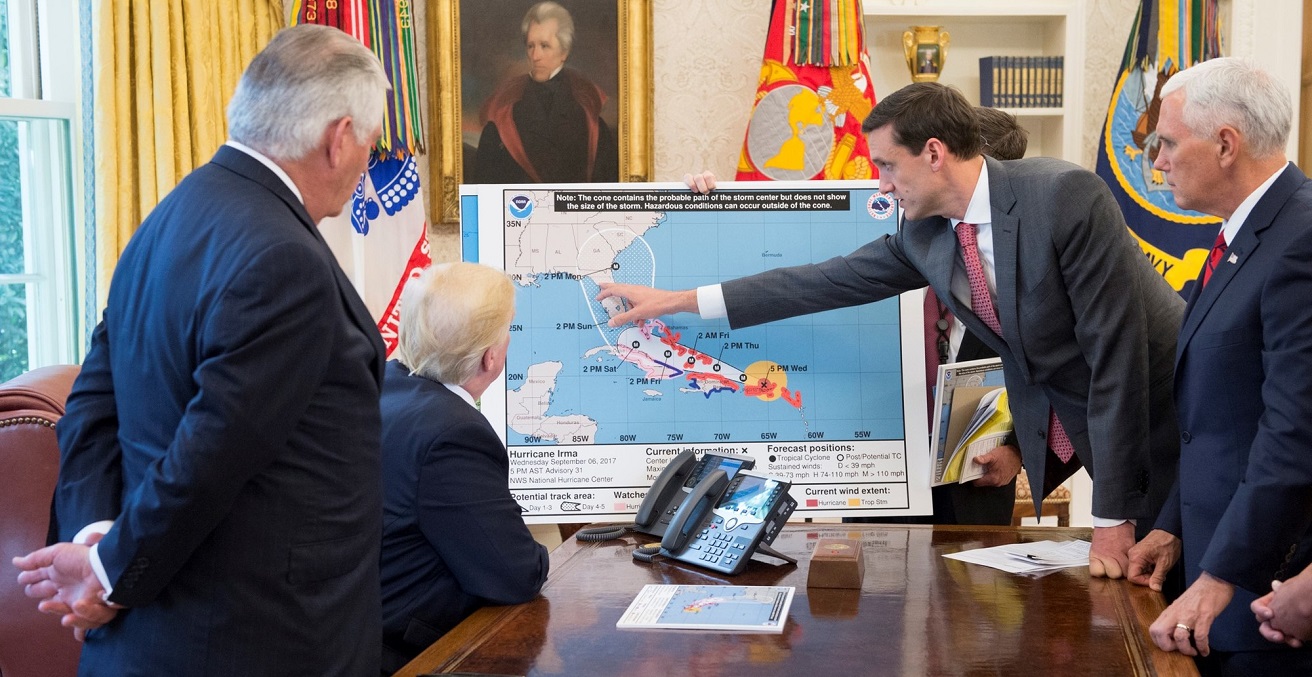Trump's Dangerous Security Oversight

The US National Security Strategy released by the Trump administration this week comprehensively outlines the country’s approach to security threats in the 21st century. But there is one glaring omission.
This week’s release of the Trump administration’s 2017 National Security Strategy (NSS) was always going to garner headlines. This is a key document outlining the United States’ strategic vision and its priorities for the new national security environment. As a country with a defence expenditure that still dwarfs its nearest rivals’ and as the most consequential security actor on the international stage, it’s a national security strategy with global security implications.
No Mention of Climate Change
One of the central headlines arising from the release of this strategy, however, focussed on what was left out: climate change.
At several levels, the omission of climate change is hardly surprising. First, there’s Donald Trump’s own position on climate change, evidenced by his comments challenging the science as well as the US withdrawal from the UN Framework Convention on Climate Change Paris Climate Accord under his leadership.
Second, there’s the fact that recognising the impacts of climate change for security and defence planning, resource acquisition and training was an initiative of the Obama administration. Trump has demonstrated a willingness to chip away at the Obama legacy at every opportunity.
Finally, this omission is unsurprising because the Trump administration has proven particularly tone-deaf to international concerns. These concerns are often focused on the need for states to act together to respond to transnational challenges, ideally with US leadership. In its position on traditional security concerns associated with North Korea and more recently the Middle East, the Trump administration has demonstrated an unwillingness to be influenced by the concerns of other states. Its position on climate change and security continues this trend.
Swimming against the tide
But while the omission of climate change from the NSS will not shock many, it may be a surprise to Trump’s Secretary of Defense, James Mattis. In testimony to the Senate Armed Services Committee in early 2017, Mattis indicated that climate change was real and posed a pressing threat to US interests and military assets. A number of accounts suggest that together with Secretary of State Rex Tillerson, Mattis urged Trump (unsuccessfully) to remain in the Paris Accord.
Then there’s the international context. The UN Security Council formally discussed the international security implications of climate change in 2007 and 2011, and again informally in 2013, 2015 and 2017. Climate change has been linked to major conflict in Darfur, Syria and even the broader Arab Spring. One recent analysis suggested that over 70 per cent of states developing national security strategies now include climate change as a core security threat. Even Australia has an ongoing Senate inquiry into the national security implications of climate change.
Climate change and security
But what is the nature of the threat posed by climate change to security?
Even before we turn our gaze to the more direct and obvious implications climate change has for human welfare and long-term sustainability of life on our planet, it throws up key challenges for national and international security.
Climate change will make natural disasters more frequent and intense. Clearly this will create destruction and trigger displacement. In 2010-11, more than 40 million people in the Asian region alone were displaced as a result of natural disasters, with costs of relief and reconstruction running to billions of dollars. But these will also increase demands for disaster relief and humanitarian assistance missions led by the military.
Natural disasters, in combination with rising sea levels, will also threaten defence resources and infrastructure throughout the world. With billions in assets and tens of thousands of military personnel throughout the world in a range of climatic settings, the US is particularly vulnerable to these types of manifestations of climate change.
And while serving less as a cause then a threat multiplier, climate change may also feed international instability and even conflict in areas central to US strategic interests. Climate-induced displacement has been linked to conflict in Darfur and climate-related agricultural decline has been linked to civil war in Syria, while a climate-affected rise in demand for—and decrease in supply of—key environmental resources (fresh water or fishing stocks) has long been linked to increasing international tension and potentially conflict.
Climate change is, in short, a first order security challenge. The scale of US military resources, and the genuinely global scope of America’s strategic interests, mean climate change is necessarily a key and pressing national security threat.
Implications of Trump’s position
The neglect of climate change in the NSS is difficult to defend in light of the above challenges, and potentially blinds the US to key threats to its security interests. But it also has important implications domestically and internationally.
For the US military, a move away from a focus on climate change poses an institutional challenge given a 2016 directive that climate change needed to be incorporated into all strategic assessments and planning. There’s also the issue that as the world’s largest military, active in theatres throughout the world, the US military is a key contributor to greenhouse gas emissions. A Pentagon study concluded that the military had accounted for 80 per cent of the US Federal government’s crude oil consumption in 2013. A reduced focus on climate change could drive a reduced emphasis on its significant ecological footprint, something that was central to the Pentagon’s embrace of climate security prior to the Trump administration.
The omission of climate change also threatens broader domestic action on climate change. The Obama administration had found—in the national security framing—a way of articulating the need for action on climate change that spoke to conservative American audiences less concerned about future generations or vulnerable populations in other countries. Trump’s position risks undermining a rationale for climate action that was convincing to some domestic audiences.
Finally, there’s the international implications of this position. Clearly, the US under Trump is no international leader on climate change. But traditionally the US has been seen as a leader in global security terms; a product both of its immense material power and its apparent commitment to defend a post-World War II liberal international order.
Excluding climate change from the National Security Strategy indicates a lack of interest in issues of central concern to those states in the international system that have traditionally joined the US in defending the liberal international order. In this sense, and consistent with US foreign policy more broadly under the Trump administration, it is a document that does more than walk away from US international leadership; it actively challenges the foundation of that liberal international order.
Associate Professor Matt McDonald teaches at the University of Queensland’s School of Political Science and International Studies.
This article is published under a Creative Commons Licence and may be republished with attribution.





